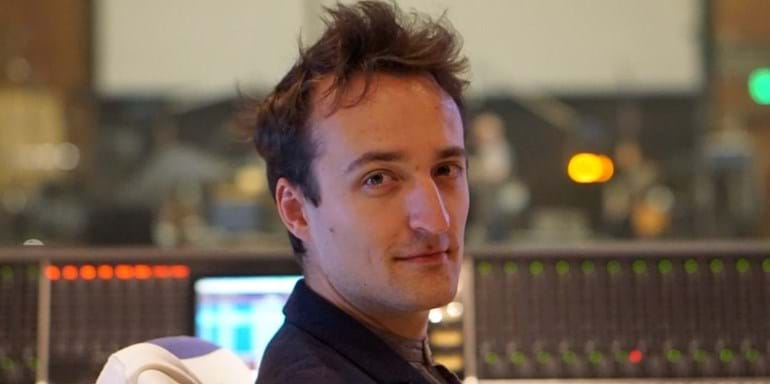
Course Studied: BA (Hons) Music (Production)
Year of Graduation: 2016
- Additional Music for the Netflix series: White Lines (released 15 May 2020)
- Working on the music for the 2020 film: Sonic the Hedgehog (additional synth programming)
- Terminator: Dark Fate (additional synth programming)
Jarrod Royles-Atkins participated in the inaugural version of Grammy nominated and multi-platinum producer and composer Tom Holkenborg’s (aka Junkie XL) SCORE Academy. Since he started working with Tom, he has received credits for the Additional Music on a range of TV Series and Hollywood Blockbusters, including Netflix’s White Lines, Sonic the Hedgehog and Terminator: Dark Fate.
We caught up with Jarrod to discuss his experiences of Leeds and Los Angeles. Here, he dispels the myth that you have to be a classically trained composer to be successful in the music for moving image world.
You participated in Tom Holkenborg’s (i.e. Junkie XL) SCORE Academy. How was the experience and what was the most important skill you learnt?
The experience was amazing. It was essentially a simulated test of what the real world of film scoring is, whilst being protected and encouraged to learn from mistakes. I improved in every aspect of being a composer and would recommend it to anyone wanting to apply!
The most important skill I learnt was probably picture sense, learning from the best on how to chapter, switch emotions, play themes and even hint at themes.
How did you secure this opportunity?
I kept participating in JunkieXL’s Facebook and YouTube events where he would do ‘#NowScoreThis’ competitions for his latest movie coming out. This involvement garnered me some attention from Tom.
As it was the first ‘prototype’ year of academies, Tom decided to keep the application call-out amongst those that were actively participating in his social media activities. I received an email asking whether I wanted to apply, and sent over 3 minutes of demo material initially (including an orchestral piece, a sound design piece, and a drum programming piece) When it was down to the top 10, we were asked to share as much music as possible - I shared an hour and 30 minutes of my work!
What’s the most exciting project you’ve worked on to date?
I would say doing Additional Music for White Lines was probably the most exciting. It required so many musical styles colliding, included 90s trance and electronic music, Cafe Del Mar Chillhouse, authentic flamenco and Spanish guitar music, filmic and emotional thematic underscoring all impacting together. The combination of these elements, as well as the incredible collaboration between my boss Tom Holkenborg, fellow employee and friend Shwan Askari, and myself made the project so incredibly creative and inspiring every day.
You’ve spent time in Leeds and Los Angeles. How important is location when working as a composer?
I’d say it’s fairly important, even today. I wouldn’t say living in a location is important, but spending 2 weeks or so travelling to a media hub like LA and being around your desired colleagues and potential employers can be very important. Making real connections and friendships is worth so much more than a cold call or email.
If you could recommend one thing for a recent graduate to invest in (e.g. a piece of equipment, time to develop a specific skill etc.), what would it be and why?
Time is the most valuable thing afforded to you whilst studying and shortly after (especially if you didn’t find yourself in work immediately like myself!).
I would invest in as many skills as possible - it will all be useful. This can be becoming more efficient at your DAW, file management, time management, developing your own sonic palette or learning technical aspects of the job.
Try to be as efficient as you can be with all your tasks, search for the best way to do everything and you will always be useful.
How did studying Music Production at Leeds Conservatoire prepare you for a career in the wider industry?
The course I did was an amazing primer for the real world. The assignments given are very similar to the ones I now receive every day at work. Brian Morrell, amongst many other tutors, really sparked my interest in storytelling and the range of uses music can provide for a movie. His lectures and the lessons I learned at Leeds Conservatoire still inform my writing to this day! The ability to work with so many different varieties of musician there is truly amazing. Collaboration and teamwork are among the main skills required in the industry. Leeds Conservatoire really allows and trains these skills to flourish.
What ignited your passion in terms of composing for moving image?
I was always interested in film music and film in general. If it wasn’t for me being in music, I wouldn’t have gone into film or psychology - I find all 3 interlock fairly tightly.
However, it wasn’t until my first year that I realised someone from a production and pop background could try their hand at composing for moving image. For me it was always something unobtainable and closed off to - available only to those who were classically trained in composition.
What advice would you give someone who wants to get into composing for moving image?
Be patient! And be kind to yourself. It’s not a race, it’s a marathon. Don’t push yourself too far at the beginning trying to get as many projects as possible and getting frustrated. Lay yourself a path of what genres or styles will best suit you, and then concentrate on getting as good as possible at that.
What’s coming up next in terms of projects?
Having just arrived back to the UK at the time of writing (due to Coronavirus) I’m still working for Junkie XL here on a movie set to come out this year. It’s a secret at the moment so sadly I’m unable to tell you more!







